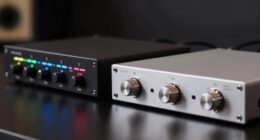To start a music school, you'll need to research market demand, develop a solid business plan, and secure funding. Begin by understanding your target audience's needs and preferences, then create a unique selling proposition to differentiate your school from competitors. Choose a suitable location, register your school as a legal entity, and obtain necessary permits. Develop a concise business plan, calculate financial requirements, and create revenue streams. Build a strong brand identity, foster a sense of community, and offer value-added services. By following these steps, you'll be well on your way to establishing a successful music school. Now, take the next step and discover the secrets to making your music school a reality.
Key Takeaways
- Conduct market research to understand demand and identify gaps in the market to create a unique selling proposition.
- Develop a solid business plan outlining mission, vision, and financial projections to guide the school's growth.
- Choose a suitable location based on accessibility, parking, and safety to ensure a convenient and visible presence.
- Register the music school as a legal entity and obtain necessary permits to operate legally and avoid penalties.
- Secure funding through loans, investors, or personal savings to support startup costs and initial operations.
Laying the Foundation
Laying the Foundation
Before you start teaching your first lesson, lay the groundwork for a successful music school by researching the market demand for music education in your area to gauge potential interest and competition. This vital step will help you understand what services are in demand, what your target audience is looking for, and who your competitors are.
With this information, you can develop a solid business plan that outlines your mission, vision, target audience, services offered, and financial projections. A well-structured business plan will guide your decision-making and help you secure funding through loans, investors, or personal savings to cover startup costs like renting space, purchasing equipment, and hiring staff.
When choosing a location for your music school, consider factors like accessibility, parking, and safety. You'll also need to register your music school as a legal entity and obtain necessary permits and licenses to operate legally.
Defining Your Business

As you begin defining your music school's identity, start by crafting a compelling mission statement that outlines your purpose, values, and goals, serving as a guiding force behind your business decisions. This will help you stay focused on what matters most and make informed decisions as you grow.
To further define your business, consider the following key elements:
- Conduct market research: Understand the demand for music education in your area and identify gaps in the market that your school can fill.
- Identify your unique selling proposition (USP): Determine what sets your music school apart from competitors and use this to differentiate your business.
- Determine financial requirements: Calculate the costs of starting and running your music school, including budgeting for staff, equipment, and rent.
- Develop a concise business plan: Focus on key elements such as target market, services offered, and revenue streams to create a comprehensive plan for your music school.
Understanding Your Market

You've defined your music school's identity, now it's time to turn your attention to understanding the market you're about to enter. Conducting market research is essential to grasp the demand for music education in your area. Identify your target audience by considering age groups, skill levels, and musical preferences. This will help you tailor your programs to meet their needs.
| Market Research Aspect | Questions to Ask |
|---|---|
| Target Audience | What age groups are most interested in music education? What skill levels do they possess? |
| Competition Analysis | Who are the existing music schools in the area? What programs do they offer? |
| Community Demographics | What is the population size and growth rate of your community? What are their interests and preferences? |
| Customer Preferences | What types of music education programs are in demand? What are the preferred schedules and pricing? |
Analyzing the competition will help you differentiate your offerings. Understanding community demographics will enable you to design programs that cater to their needs. Surveys, focus groups, and feedback will provide valuable insights into customer preferences and needs. By doing so, you'll be able to create a music school that meets the demands of your target audience, setting you up for success.
Building Your Brand

Develop a unique brand identity that resonates with your target audience by crafting a distinctive studio environment, fostering a sense of community, and incorporating customer feedback to continuously improve your brand image.
To build a strong brand, focus on the following key elements:
- Immersive Studio Environment: Create a unique and immersive studio environment that differentiates your music school brand from others.
- Sense of Community: Foster a strong sense of community and belonging to enhance your brand identity and make students feel connected.
- Customer Feedback: Use customer feedback to continuously improve and strengthen your brand image, ensuring you meet the needs of your target audience.
- Value-Added Services: Implement creative ways to add value beyond traditional music lessons to build a memorable brand that stands out from the competition.
Securing Funding

When securing funding for your music school, you'll want to explore various strategies to attract private investors and craft a compelling grant proposal. To stand out from the competition, it's crucial to develop a clear, concise pitch that highlights your school's unique value proposition and demonstrates a solid business plan.
Grant Writing Strategies
Securing funding is an essential step in launching a successful music school, and grant writing strategies can play an important role in this process. To increase your chances of securing grants, it's vital to identify grant opportunities from music education foundations and organizations that align with your school's mission and goals.
Here are some key strategies to keep in mind:
- Develop a compelling grant proposal that outlines the need, goals, and impact of your music school, highlighting the unique aspects that align with the grant provider's mission.
- Clearly outline the budget breakdown and how the grant funds will be utilized to achieve the proposed goals and objectives.
- Follow up with the grant provider and provide any additional information they may require for consideration, demonstrating your commitment to the project.
- Tailor your proposal to each grant provider, ensuring that your application meets their specific requirements and priorities.
Private Investors Sought
You'll need to convince private investors that your music school has the potential to generate significant returns on their investment, making it an attractive opportunity for them to get on board. In exchange for funding, private investors may seek ownership or a return on investment. This type of funding can cover startup costs, equipment purchases, and operational expenses, giving your music school a solid foundation.
To pique the interest of private investors, you'll need to demonstrate growth potential and a solid business plan. They'll want to see a detailed financial forecast, outlining how their investment will be used and when they can expect to see returns.
Consider pitching your music school idea to angel investors, venture capitalists, or private equity firms. These investors typically look for opportunities with high growth potential, so be prepared to showcase your school's unique value proposition.
Launching Your School

Now that you've secured funding, it's time to define your target market and find a location for your music school.
You'll want to identify the demographics and needs of your potential students, such as children, adults, or seniors, to tailor your services and marketing strategy.
Define Your Target Market
One essential step in launching your music school is to identify the specific group of people you want to cater to, as this will shape every aspect of your business. Defining your target market is essential in determining the direction of your school and ensuring its success.
To do this, consider the following key factors:
- Age groups and skill levels: Who do you want to teach? Children, teenagers, or adults? Beginners, intermediate, or advanced learners?
- Musical genres and styles: What type of music will you specialize in? Classical, jazz, rock, or pop?
- Geographic location: Where's your target market concentrated? Urban, suburban, or rural areas?
- Preferences and needs: What do potential students and their families want from a music school? Convenience, affordability, or expert instructors?
Conducting market research will help you understand the demand and competition within your target market. This will enable you to tailor your services to meet the specific needs of your target audience, setting your music school up for success.
Secure a Location
With your target market defined, it's time to find a location that will appeal to them and help your music school stand out.
When selecting a location, consider a central spot with high foot traffic and visibility to attract students. This won't only make it easier for them to find you but also increase the chances of walk-in inquiries.
Make sure the location is convenient and accessible for both students and parents, with ample parking and proximity to public transportation. Avoid areas with high competition from existing music schools to establish a unique presence.
It's also important to confirm the location meets zoning requirements and allows for the setup of a music school. Evaluate the cost and lease terms of the location to fit within your budget and financial plan.
Frequently Asked Questions
How to Establish a Music School?
To establish a music school, you'll need to secure necessary permits, design a curriculum, hire qualified instructors, invest in quality instruments, and create a welcoming environment that fosters a sense of community.
How Much Do Music School Owners Make?
You can earn an average of $40,000 to $70,000 per year as a music school owner, but success depends on factors like location, size, and business success, with top earners reaching over $100,000 annually.
How to Start Music Classes?
To start music classes, you'll determine the types of classes to offer, create a curriculum, hire qualified instructors, and invest in necessary equipment. Then, promote your classes to attract students and build a strong student base.
How to Grow Your Music Academy?
To grow your music academy, focus on retention and acquisition strategies, such as referral programs, workshops, and targeted marketing, to expand your reach and attract new students, increasing enrollment and revenue.
Conclusion
Congratulations, you've made it From idea to reality, you've navigated the ups and downs of starting a music school. Pat yourself on the back, take a deep breath, and accept the fact that you're now responsible for a bunch of noise-making, instrument-wielding students. Your journey from brainstorming how to start a music school to actually running one has been nothing short of inspiring. Now, the real adventure begins—transforming that noise into harmony and nurturing your students’ potential. Remember, each off-key note and squeaky string is a step closer to creating a community of passionate musicians.
Just kidding (kind of). Seriously, though, you've got this. You've laid the foundation, defined your business, and secured funding. Now, go make some beautiful music and maybe, just maybe, a profit.










